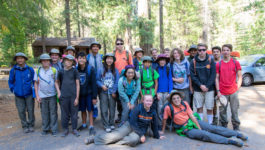(Remember that for all Scoutmaster Conferences and Boards of Review
the Scout must be in full uniform.)
There are several ranks that need to be earned on the trail to becoming an Eagle Scout. When a boy joins Troop 27, he begins with the rank of “Scout”. The first three ranks are Tenderfoot (see Boy Scout Handbook for the requirements and guidance), Second Class and First Class. Next come Star and Life. The highest rank is that of Eagle Scout. Each rank is more challenging than the one before it.
A scout should remember to have his handbook signed whenever he completes a requirement! Requirements are signed off by an ASM, not by a scout or a parent. When the requirements for the next rank have been completed, the scout needs to contact the Advancement Chairperson and set up an appointment for a Skills Review and Scoutmaster Conference. Study sheets are available on the troop website to assist the scout in reviewing, and it is a good idea for a parent to review the study sheet with the scout to be sure he is ready. This is educational for the parent as well as the scout!
ACTIVE PARTICIPATION DEFINITION
Many ranks require the scout to have been “active” in the troop for a specified period of months. The Troop Parent Committee approved the following definitions: to receive credit for being active as a general Troop member the scout must attend 50% of the meetings and outings; to receive credit for being active in a leadership position the scout must attend 75% of the meetings and outings for the time period specified. See the section on the Program for Older Scouts for the requirements of the Troop Guide or Instructor leadership office. If a scout cannot attend some camp outings other Troop activities such as service projects may be substituted if approved by the Scoutmaster. In order to make a positive contribution to the Troop, a Scout must actively participate at meetings, activities and outings. This expectation is a primary determinant in evaluating Scout Spirit for each rank from Tenderfoot to Eagle. Any scout not able to meet these minimum levels must discuss alternatives with the Scoutmaster.
SERVICE HOURS
Nearly every rank requires service hours that can be fulfilled by: helping the Church with the Home & Hope (IHN) set up or take down; Scouting for Food; helping at Laurelwood Park/Sugarloaf Open Space Clean Up; Memorial Day Grave Decoration; helping another Scout with his Eagle Project; helping at a Church Clean Up Day; and other Scoutmaster approved projects. Use the Service Hours Form (See separate sheet) and get approval of your service project first, then record the hours. Turn this form in to the Advancement Chairperson. It is also a good idea to note the date, project and hours of service in the Scout’s Handbook inside the cover or in the margins of the rank advancement pages.
SKILLS REVIEW AND SCOUTMASTER CONFERENCE
A Skills Review is conducted by two adults, either the Scoutmaster and/or one or two Assistant Scoutmasters (ASM) (may supplement with one unregistered, unrelated parent during busy times such as just before a Court of Honor). During the Skills Review, the scout reviews the material that he has accomplished to reach this rank by answering questions and demonstrating skills. This reinforces what the Scout has learned in the Troop. Skills Review sessions can last anywhere from 1 to 6 hours depending upon the rank being completed; the higher the rank, the more involved. At the end of the review, the scout will have a brief conference with the Scoutmaster to review his goals, achievements and plans.
Remember — that at all times a T27 Scout is to know the history of scouting; know and be able to recite the Preamble to the Constitution of the United States; know and be able to explain the original Bill of Rights; know the 13 original colonies; know the flags that have flown over the United States; and the meaning of the Scout badge. (See Section on Information a Scout Must Always Be Able to Do and/or to Know!)
Board of Review — After a scout has completed a Scoutmaster’s Conference, he needs to schedule a Board of Review. There the scout will answer general questions and review what he has been doing in the troop, how he likes scouting, etc. A Board of Review is usually a short, general interview lasting about 10-20 minutes.


